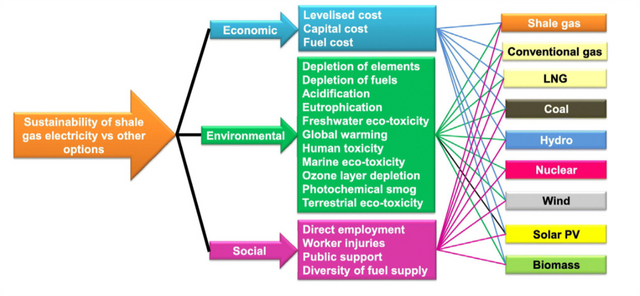What I learnt this week 27: Shale's unsustainablity, The Fat One, Black Death Fake News, Dirty microwaves & Eternal Life!

This image will make sense later
A lot of ideas being overturned this week. Who knew humanity could be so wrong so often, eh? What do I mean? Find out below!
Monday: Shale Shock
I couldn't think of anything better than that title, get over it.
Shale gas has for some time been touted as some kind of solution to pollution, the conclusion of collusion between the fusion of government and corporation in a culmination of nations and... ok I'll stop.
The point is, though Shale is thought to provide plenty of jobs and low environmental impact, it could be the future of energy! But a major study from Manchester University in the UK throws a whole lotta doubt on that. In fact, out of 8 of the top forms of electricity production, shale comes in at an overall 7th for sustainability.
Other contenders were as you might expect:
- Coal
- Nuclear
- Natural Gas
- Liquified Natural Gas
- Solar Energy
- Wind Energy
- Hydroelectric energy
- Biomass
In fact, in order to make shale more realistically viable, there would need to be a 16 fold increase in jobs, a complete overhaul in the efficiency of the process and an over 300-fold improvement on environmental impact.
Typically the best route is known to be a mixture of several of these energy sources, but it turns out the less shale we put into the mix, the better.
How did they come to this conclusion?
There were 18 indicators used, summed up in this handy graphic:

This fairly large number of factors was key. Most previous studies only looked at environmental factors, ignoring any socio-economic risks that may be involved. This is significant because most people are quick to shrug off any environmental issues. Like, sure it's bad I guess but... eh, whaddya gonna do?
But when it comes to opening your wallet or affecting your family's health, then people take issue.
In fairness, Fracking is already banned in Scotland and opposite has always been strong in England. It's a wonder how the government still feels it's a good idea in a supposed democracy! But that's for another day.
Tuesday: The Fat One

Actual photo compliments of NASA
Numbers are hard to get your head around sometimes. Sure, 1,000 is fine. A million even. But you can't very well visualize a million. So when people say there are at least 100 billion stars in most galaxies or whatever, our minds just float over that number and envision some impossibly huge number.
Our minds of course, don't even come close to appreciating what that number means, and it doesnt help when people start estimating the number of stars in the Universe. Unfortunately, that number just got impossibly larger, whatever it was to begin with.
Hubble, hard at work as always, just discovered a new, really big galaxy cluster. How big, you ask?
Well the estimated mass is somewhere around three million, billion stars. Translation: 3,000,000,000,000,000 stars.
The mass is a galaxy cluster... in fact, two galaxy clusters colliding with each other. Galaxy clusters are the biggest known 'objects' in the universe, unified as an object by their nature of all the galaxies being bound by gravity.
You can try to imagine this, but I doubt you'll succeed: A group of galaxies, spanning hundreds of millions of lightyears across, bound together, travelling through space until they smash into another bunch of galaxies to form, well... El Gordo, its official name, translated from Spanish as 'The Fat One'.
Just picture that fight scene from Michael Jackson's 'Bad' and you're pretty much there. Frankly, I find the most astounding thing is that the nature of the Universe makes it totally normal that we simply missed this until now. Just a blip on the radar, nothing to see here. Let that sink in.
Wednesday: Black Death Fake News

'I'm Innocent!'
I've often complained about how school had given me a distorted sense of reality based on old science and knowledge that has since been updated over and over. For example, we learnt that Dinosaurs were bald, scaly reptiles like crocodiles, when in fact, many or most of them were feathery like birds. We learnt they were Cold blooded when they were very likely warm or some kind of mix. We learnt that the Stegosaurus would fight with the T-rex, when actually the T-rex was closer to us humans on the time line than it was to the Stegosaurus.
Not sure why we were so terrible at dinosaur facts... Anyway, we were also taught that Rats caused the Black Death, and then later it was actually the fleas on the rats that did it.
Well, the latest reason puts a nail in the coffin of that idea, too.
This kind of makes sense. The sheer speed of the spread of disease seems bizarrely unlikely if the fleas were to all juump from a dead rat's body onto humans. How many rats do you think were lingering around people close enough for fleas to simply hop from one to the other? On top of that, there were no such reports of massive swathes of rat deaths, implying they weren't being affected.
So who was the culprit?
Looking at as much data as possible, researchers looked at three possible causes; rats, airborn illness and human 'ectoparasites' - fleas and lice. Three guesses which one turned out to be the most credible.
Got it in three, nice! Yep, it was in fact human fleas and lice that was the only method for the disease to spread to such an extent that 25 million people were killed.
More historical research backs this up by showing how these fleas and lice were incredibly common back in those days due to miserably disgusting hygiene practice. So there you are. Start re-teaching your kids and give 'em a good hosing. There's a plague outbreak right now in Madagascar you know!
You can read more here (Paywall)
Thursday: Put Down that Microwave!

This guy's got the right idea
Microwaves... terrible, evil things. First they fry your brain with that deadly radiation, then they record your private conversations. Now it turns out, thanks again to the University of Manchester, that they're also prominent contributors to Global Carbon Emissions and thus the death of our planet.
This is no joke, really. The study found that in the EU alone, their usage is equivalent to the CO2 emissions of almost 7 million cars per year.
According to Google there are 291 million active cars in Europe, so microwaves essentially add a little under 2.5% on top of that. Hardly insignificant!
In other statistics, this is the equivalent of the entire output of 3 gas power plants, or 9.4 terawatt hours per year.
Of course this is not purely from the usage heating up last night's pizza, but at the end of their life, they have to be disposed of, and with a microwave lifespan reduced from 15 years in the 90's to just 8 years now, we have over 16 million being sent for disposal across Europe each year.
The main issue I see here is that the only solution is going to be regulation, and that is incrediibly unlikely to be seen any time soon. All you can do is, well, tell your microwave what you think. The government will be listening.
Friday: Eternal Life, or clickbait?

If you want it so bad, maybe it's time to stop praying for it, and start studying for it
This one actually took me quite some time to get my head around so bear with me.
The search for an anti-ageing elixir, eternal life, has been a long one. It mostly feels like some fantasy that futile researchers desperately seek from their irrationally intense fear of death, only to end up, well, dead.
But not only have we already extended our average lifespan by decades over history, but real research is coming up with real results to make that even longer. Many legitimate researchers even debate the possibility that the first 200-year old human has already been born.
So what's new? Well, it all comes down to hormones and proteins.
Once Upon a Time
Wayyyyy back in 1997, research in mice found that they would suffer premature aging, heart disease, mental disease and cancer when either αKlotho or FGF23 were removed from them. These are two proteins, and the former was at the time said to function as an anti-ageing hormone, acting on its own to increase longevity.
Now that conjecture has been thrown out, and αKlotho simply functions as FGF23's receptor. This means that although FGF23 can't function as an ageing suppressant alone, it does appear to be the underlying cause, rather than αKlotho which simply allows it to trigger.
This understanding allows researchers to encourage this triggering as necessary, potentially allowing FGF23 to boost our lifespans in some way, but that's not really why this research is so important. This would be a nice end goal, but that's something far, far away.
Right now, the study has more potential. FGF23 also functions to fight hypertrophy of the heart, where the tissues thicken and cause a whole bunch of issues. It also helps in development of Kidney disease medication and a method to keep blood sugar levels down, helping with cures for diabetes and obesity.
This is because the study also looked at the related hormone beta-Klotho which works together with the related hormone FGF21.
What I've mostly learnt from this is not to shrug or frown at fantastical-sounding research, when the underlying implications can be so much greater if you take the time to read it!
So that's it for now! In summary, stop using your microwave, wash your kids, throw away their school books, buy some solar panels and look up to the stars, even though you can only see about 0.000000000000000000000000000000000000000001% of them. Your imagination can do the rest. Thanks for reading!

All Images CC0 licensed
"But when it comes to opening your wallet or affecting your family's health, then people take issue." - @mobbs
"How many rats do you think were lingering around people close enough for fleas to simply hop from one to the other?"
Way more than you want to think about. There is a movie called "Rats" that is truly disturbing. There is currently a plague outbreak a lot closer to home, in the Southwest US.
It's actually quite surprising some of the footage I've seen with rat swarms coming out of barns and such, but for the most part it does seem far more reasonable that human-sucking fleas would have far more success, being constantly around other humans and the like. Rats don't typically lie around next to you by the fire reading scrolls to your kids!
This show was filmed mostly in NYC and they showed how you can poke a camera into any crack in the sidewalk or any void and they are just loaded with rats. And how the rats there have been found carrying almost every disease known to man, even like bot flies which are not supposed to exist in North America.
There was a Scientific American Frontiers years ago discussing telomeres and researchers who had made worms live 8x as long by extending their telomeres. Another guy had rats living twice as long with only a special diet.
I think you're referring to the Nematodes, an amazing little creature that indeed had its life extended as such. I was thinking of giving it a name drop but couldn't fit it in!
It's funny because just yesterday I was thinking about how many of the things on that show are still on the cutting edge and have not yet become part of the common knowledge.
The main issue I see here is that the only solution is going to be regulation, and that is incrediibly unlikely to be seen any time soon. All you can do is, well, tell your microwave what you think. The government will be listening.
Right but of course microwaves are much more efficient than the alternative cooking devices, how much energy would the UK use if everyone had to use a kettle on the stove to make their tea?
Correct, though I think the main crime is the materials being dumped and repurposed/recycled to such a huge extent, rather than the actual consumption of power like a kettle. Then again, I wonder how many kettles get replaced every year...
The microwave study (at least in the article you referenced) doesn't compare use to other cooking methods. It may be that they're still more efficient in energy use that cooking on the stove. But perhaps reduced microwave use time and keeping units longer will help.
Exactly, they are far more efficient, and that is before you consider running air conditioning to get rid of the waste heat from ovens and stoves.
Yeah right, I presume it's not meant to be a comparison - there are plenty of things that are affecting our carbon footprints - but more an awareness that even the things we don't even consider are having a profound effect. It would be good to see the comparison though, since I feel confident microwaves are replaced much more often than ovens (especially since ovens barely even exist over here in Asia)
We have a saying in the USA: There Ain't No Such Thing as a Free Lunch (TANSTAAFL). In other words, every choice has a cost.
Yep, though we all like to think the contrary...
Omg buddy!! Does microwave really fry the brain? :(
Damn, I've been using microwave all these while.
Brain = fried :(
Nice piece buddy. I've Learnt a lot from what you learnt
Really hard to tell if you're joking these days...
I really have this weird nature of joking, even with serious things.
My friend once told me that the best ideas come as jokes.
That is why I keep my thinking as funny as possible :)
is it really more economical to heat your food by turning on the real oven? To me it seems that even more energy would be wasted, even if the disposal was't that much of an issue then.
Now now don't jump to conclusion, the study isn't saying microwaves are worse, just that they have a profound impact we didn't recognize before. To say they are worse than ovens would have to be left for another study!
true. But if they are not worse, there's not really a point.^^
It seems the study comparing them to ovens would be a very important follow-up.
I wouldn't say pointless, it pushes the narrative to improve longevity in design or more efficient recycling or whatever as far as the government is concerned, though little can be done on the individual's end. It's an issue oven's don't really have since they typically last for decades. Whereas ovens have a gas footprint issue (presumably), it's not very much related to the microwave waste material issue. These things have to be looked into, one step at a time
I still like these posts, they are good to scan and learn something in tidbit form. Space is still so mind boggling to me, thats a big cluster lol
Fancy seeing you here! Nice of you to pop by and I'm glad you can enjoy these little tidbits once in a while =D
(Though I keep failing at keeping them actually bite-sized...)
You had my attention at, "first 200-year old human". Its amazing how far we have come.
Awesome post! I love to read this kind of mix of facts all neatly summarized. Im particulay interested in your part on shale gas. Even though its been hugely discredited, our illustrious politicians here in Oz are starting to tout its benefits. Hmmmm.
Amazing isn't it? Money SPEAKS